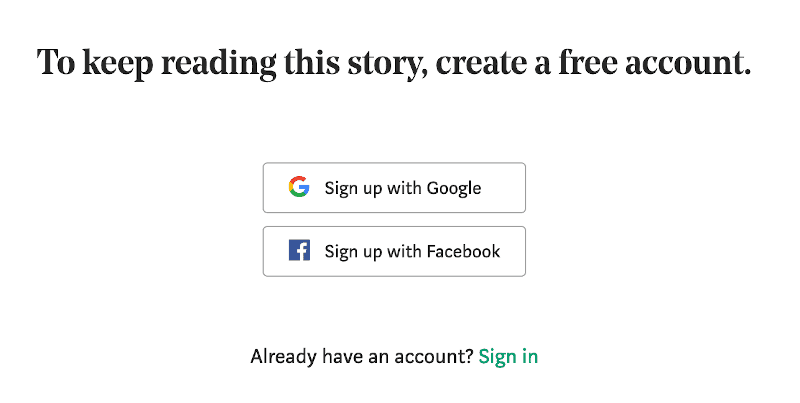
Medium is an extremely popular blogging platform for both newcomers and expert tech-savvy bloggers. I’ve noticed the serious SEO related issues with using it as your main blogging tool. Read on if you are curious how Medium hurts your internet brand and what’s the alternative.
Authority of your blog domain (SEO ranking)
Search engine optimization is a complex subject. One of the few things that are known for sure is that so-called backlinks can improve website’s position in the search results. The more backlinks from good quality sources, the better it ranks in search results for a given term.
One caveat is that a backlink has to be an <a> HTML element without a rel="nofollow" added to it. A nofollow attribute is a way to tell the search engine “Ok, he is here, but I don’t know this guy.” and deprive the link of all the authority value it would provide otherwise.
Are Medium links dofollow?
Medium adds a rel="nofollow" to ALL the links by default.
What are the practical implications of nofollow?
Let’s say you are a software company and your website is the-best-devs-out-there.com. You hire a lot of smart guys and one of them publishes a technical blog post on Medium. The blog post goes viral, it is shared a lot on social media and gets featured in a couple of newsletters. Newsletters usually don’t add nofollow attribute to featured links and could have a lot of authority in the eyes of Google themselves.
Value of all the backlinks from social media and newsletters goes directly to Medium. Although your website the-best-devs-out-there.com is provided in the blog post footer, it is a nofollow link so does not give any authority (even indirectly) to your website.
If the blog post was published on the-best-devs-out-there.com/blog instead than all the valuable sources linking to your domain could significantly boost your Google ranking. Not only the ranking of the page with the viral blog post but also the homepage. It would help you rank higher for the keywords you are targeting there (e.g. best outsourcing team, quality developers).
This problem is also present if you use Medium with your custom domain, e.g., blog.the-best-devs-out-there.com. Your root domain does not benefit from SEO rating your posts get. You can read a detailed analysis of this case in my other blog post.
I partially use this blog as a content marketing platform for my project Abot - Anonymous poll and messages for Slack. I redirect and convert part of my blog’s audience to paying customers, and boost the Abot landing page SEO rating using dofollow links. It would not be possible with Medium.
If you have your own website and still publishing blog posts on Medium you are missing a great opportunity for improving SEO.
Login wall for free articles
You may not be aware of the UX that many of your potential readers will get when accessing your article from the Google search results:

You might have never seen it because you have a Medium account. But do you think that a random reader will proceed to sign up just to read your article or click back and look for one that’s more easily accessible?
Google measures how many users clicked back to the results page without reading the blog post. A high bounce rate can drastically lower your SEO rating. You think that your writing should work for your benefit or to improve Medium signed users stats?
Hidden costs of publishing on Medium
“But Medium is for free…”
That’s right, you can start publishing on Medium without paying a cent. You can save money you would spend on hosting if you used a custom blogging tool.
Let’s do some quick maths:
If you are a tech person than an hour of your work is probably worth tens of $$. One blog post is at least a couple of hours of work and could be valued in hundreds. If you write a blog post a couple of times a month you offer ~1000$ worth of work to Medium for free.
My hosting costs for this blog are 5$/month. I use jekyll on Hetzner Cloud VPS and Cloudflare.
There are also yearly costs of domain renewal. You can check out my other blog post if that’s an issue for you. You can save money by setting up multiple domains with free SSL.
Benefits of a custom blog engine
I use a pixyll template for this blog. Out of the box it gives you a very nice looks,
class Proper
def syntax
:highlighting
end
# not some GitHub gists
endand a lot of other bells and whistles, in some cases superior to Medium.
It is true that until now I did spend some time tinkering with it, but you don’t need that to get started. Needless to say that customizing your blogging template is a great way to polish your developer skills.
[Update] I am giving away the template of this blog together with a bunch of SEO optimizations: jekyll SEO template.
Summary of Medium SEO effects
I know this blog post just scratches the surface of a really complex problem. Let me know if I got something wrong. In any case selling your personal brand for a fancy WYSIWYG editor does not seem to be the best trade-off.

